Hurricane Preparedness: Essential Lock and Security Measures for Englewood Homes
Living in Englewood, Florida, brings a unique set of challenges and responsibilities, especially during hurricane season. While most homeowners focus on reinforcing windows, securing loose outdoor items, and stocking up on emergency supplies, one critical aspect often gets overlooked: the integrity of your locks and overall home security. Hurricanes not only pose threats from strong winds and flooding, but also from the increased risk of burglary and property damage during and after the storm. In this comprehensive guide, we’ll explore the crucial lock and security measures every Englewood homeowner should implement to protect their family, property, and peace of mind before, during, and after a hurricane.
This post will provide local safety tips, expert advice on hurricane-resistant security systems, and step-by-step strategies to fortify your home against both natural disasters and opportunistic intruders. Whether you’re new to coastal living or a seasoned Floridian, these insights will help you create a safer, more resilient home environment.
Understanding the Unique Security Challenges During Hurricanes
Hurricanes bring more than just destructive winds and torrential rains. When a storm approaches, neighborhoods often experience power outages, communication breakdowns, and in some cases, temporary evacuations. These disruptions can create vulnerabilities that burglars and looters may exploit. According to the U.S. Department of Homeland Security’s hurricane preparedness guide, property crime tends to spike in disaster-stricken areas, making security a top concern for homeowners.
Additionally, the physical force of a hurricane can compromise traditional locking mechanisms, especially if doors and windows are not reinforced. Flying debris, pressure changes, and moisture intrusion may weaken or break locks, leaving homes exposed. Englewood’s coastal location increases these risks, requiring residents to take proactive steps beyond standard hurricane preparations.
Assessing Your Home’s Current Security Before Hurricane Season
The first step in hurricane security preparedness is to conduct a thorough assessment of your home’s existing locks, doors, windows, and alarm systems. Begin by inspecting all entry points, including front and back doors, garage doors, sliding glass doors, and accessible windows. Check for signs of wear, rust, or damage, particularly in locks and hinges, which can be exacerbated by the humid coastal climate.

Next, evaluate the security features of your current locks. Standard pin-tumbler locks or low-quality deadbolts may not withstand the force of hurricane winds or potential tampering. Upgrading to high-security deadbolts, reinforced strike plates, and hurricane-rated door hardware can significantly enhance your home’s resilience. Consider consulting with a certified locksmith familiar with hurricane safety standards to identify weak points and recommend tailored solutions.
Finally, review your alarm system and surveillance cameras. Ensure all systems are operational, batteries are fresh, and remote monitoring features are enabled. If you don’t yet have a security system, now is the time to invest in one that offers cellular backup, ensuring functionality even if landlines and Wi-Fi go down during the storm.
Essential Lock Upgrades and Reinforcements for Hurricanes
Not all locks are created equal, especially when it comes to withstanding hurricane-force impacts. Consider the following upgrades for maximum protection:
- Grade 1 Deadbolts: These are the strongest residential locks, tested to withstand severe force. Look for those with reinforced steel construction and anti-saw pins.
- Hurricane-Rated Door Hardware: Specialized locks and handles are available that meet rigorous hurricane codes, ensuring doors stay secure even under extreme pressure.
- Multi-Point Locking Systems: Commonly used in hurricane-prone regions, these locks secure doors at multiple points along the frame, dramatically increasing resistance against forced entry and wind pressure.
- Impact-Resistant Strike Plates: Reinforcing the strike plate with 3-inch screws driven into the wall stud, rather than just the doorjamb, provides added strength and prevents the door from being kicked in.
Don’t forget about secondary entry points, such as garage doors and sliding glass doors. Install heavy-duty locks, security bars, or hurricane-rated shutters to keep these vulnerable areas secure.
Securing Windows, Sliding Doors, and Other Vulnerable Entry Points

Windows and sliding glass doors are particularly susceptible during hurricanes. Flying debris can shatter glass, and poorly secured frames can be forced open by wind pressure. To protect these areas, install impact-resistant glass or hurricane shutters. If replacement isn’t feasible, consider using security window film, which holds broken glass together and delays entry.
For sliding doors, install a secondary locking mechanism such as a security bar or a pin lock. Regularly check the tracks for debris and ensure the door fits snugly within the frame. For added protection, place a wooden dowel or metal rod in the track to prevent the door from being forced open. The Federal Emergency Management Agency’s guidelines on wind retrofit recommend reinforcing all window and door frames with heavy-duty screws and brackets.
Don’t overlook smaller windows, such as those in bathrooms or basements. These should also be fitted with locks and, if possible, covered with storm shutters or impact film. Remember that burglars often target less obvious entry points during the chaos of a storm.
Protecting Garage Doors and Outbuildings
Garage doors are another common weak spot in hurricane defense. A blown-in garage door can lead to catastrophic roof failure due to sudden changes in air pressure. Strengthen your garage by installing a hurricane-resistant bracing kit and upgrading to a reinforced locking system. Always lock the interior door connecting the garage to your home, and consider adding a deadbolt for extra security.
For sheds, workshops, or other outbuildings, use heavy-duty padlocks and reinforce hinges with carriage bolts and security screws. These structures often house valuable tools and equipment that could be stolen or used to facilitate a break-in.
Integrating Smart Home Security for Hurricane Resilience
Modern technology offers a range of smart home solutions that can bolster your security, particularly when you need to evacuate or shelter in place. Smart locks allow you to lock or unlock doors remotely, grant temporary access to neighbors or first responders, and receive instant alerts if someone attempts to tamper with your entry points.

Pair your smart locks with wireless security cameras and motion sensors. Choose systems with battery or solar backup to ensure continuous operation during power outages. Many smart home devices can be integrated into a single security ecosystem, accessible from your smartphone or another device. The Consumer Reports guide to smart locks offers valuable insights into the best products for hurricane-prone regions.
Finally, consider installing a monitored alarm system with a cellular connection, which will remain functional even if local power and internet are out. Some systems can automatically alert local authorities and provide real-time video feeds, adding an extra layer of protection during and after a storm event.
Backup Power Solutions for Security Devices
During hurricanes, extended power outages are common. To ensure your security systems remain operational, invest in backup power options. Uninterruptible power supplies (UPS) can keep security cameras and alarms running for several hours. For longer outages, consider a portable generator or solar-powered backup for critical devices. Check that all battery-powered components are fully charged before a storm approaches.
Regularly test your backup systems and replace batteries as part of your annual hurricane preparedness routine. Reliable power for your security system can make all the difference in deterring intruders and providing peace of mind.
Establishing a Neighborhood Security Network
Community cooperation is an often-underestimated component of hurricane preparedness. Englewood neighborhoods that work together tend to fare better during and after storms, both in terms of property protection and overall safety. Establishing a neighborhood watch or security network allows residents to share information, coordinate evacuation plans, and keep an eye on each other’s homes when someone is away.
Utilize group messaging apps or social media platforms to stay connected during emergencies. Designate trusted neighbors to check on each other’s properties and report suspicious activity. The National Neighborhood Watch resource library offers helpful tips for organizing local security initiatives.

After the storm passes, continue to communicate and support neighbors, especially the elderly or those with mobility challenges. A strong community network is one of the best deterrents against opportunistic crime during vulnerable times.
Emergency Planning and Communication
Every hurricane preparedness plan should include detailed steps for emergency communication. Make sure all family members know how to operate locks and security systems, and establish a protocol for locking up if you need to evacuate quickly. Share spare keys only with trusted individuals, and keep a list of emergency contacts handy.
For those with medical or mobility issues, pre-arrange for assistance and ensure caregivers have access to necessary keys or entry codes. Regular drills and reviews of your emergency plan will help everyone stay calm and organized when a hurricane threatens Englewood.
Post-Hurricane Security: What to Do After the Storm
Once the hurricane has passed, the risk isn’t over. Damaged locks, broken windows, and downed fences can make your home a target for thieves or vandals. Begin your post-storm recovery by inspecting all entry points for damage, prioritizing repairs to locks and doors. Document any damage for insurance claims, and make temporary fixes with boards, tarps, or portable locks if needed.
Report any suspicious activity to local authorities and coordinate with neighbors to monitor each other’s properties. If you use a smart security system, review footage to ensure there were no unauthorized entries during the storm. The American Red Cross hurricane recovery tips provide additional guidance for safely re-entering and securing your home after a disaster.

Finally, review your preparation process and make note of any improvements for next time. Regular updates to your security measures will keep your Englewood home protected year after year.
Updating Insurance and Security Documentation
After a hurricane, promptly update your homeowner’s insurance with documentation of any new lock or security upgrades. This may not only help with claims but could also provide premium discounts. Keep an updated inventory of valuables and photographs of your home’s security features in a secure, cloud-based location.
Consult with your insurance provider to ensure your policy covers hurricane-related theft or vandalism. Taking these steps before and after a storm can expedite recovery and minimize financial loss.
Building a Hurricane-Resilient, Secure Home in Englewood
Hurricane preparedness in Englewood extends beyond plywood and sandbags. By prioritizing lock and security upgrades, integrating smart technology, and fostering community cooperation, you can create a fortress that stands strong against both natural and human threats. Regular assessments, timely upgrades, and effective communication are your best tools for safeguarding your family and property during hurricane season.
Remember, the time to act is before the storm clouds gather. Invest in high-quality locks, reinforce vulnerable entry points, and build robust relationships with your neighbors. For more in-depth resources on emergency preparedness, refer to the National Weather Service’s hurricane planning checklist. With the right measures in place, your Englewood home can weather any storm with security and confidence.
Need help with Hurricane Preparedness: Essential Lock and Security Measures for Englewood Homes?

